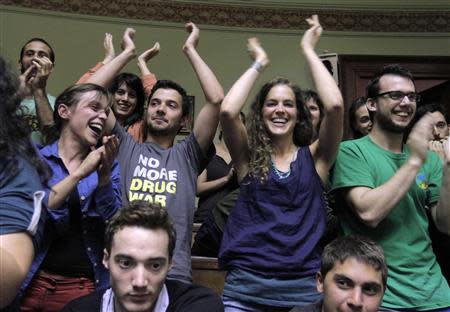Uruguay's move to legalize marijuana breaks treaty: INCB
By Fredrik Dahl VIENNA (Reuters) - Uruguay's legalization of marijuana violates an international drug control convention and fails to consider a negative health impact, a body set up to monitor compliance with the five-decade-old treaty said on Wednesday. The president of the International Narcotics Control Board (INCB), Raymond Yans, said the change would not protect young people but would rather have the "perverse effect of encouraging early experimentation" and lowering the age of first use. Adding weight to the criticism of Tuesday's move by Uruguay - the first country to take such a step - the U.N. anti-drugs office said it agreed with the INCB and that states should work closely together to deal with the global drugs challenge. "It is unfortunate that, at a time when the world is engaged in an ongoing discussion on the world drug problem, Uruguay has acted ahead of the special session of the U.N. General Assembly planned for 2016," David Dadge, spokesman for the U.N. Office on Drugs and Crime (UNODC), said. In an experiment that will be closely watched by other nations debating drug liberalization, Uruguay became the first country to legalize the growing, sale and smoking of marijuana, A government-sponsored bill approved in the Senate provides for regulation of the cultivation, distribution and consumption of marijuana and is aimed at wresting the business from criminals in the small South American nation. But the Vienna-based INCB said the legislation contravenes the 1961 Single Convention on Narcotic Drugs, to which it said Uruguay is a party. The convention requires states to limit the use of cannabis to medical and scientific purposes, due to its dependence-producing potential, Yans said in a statement. He was surprised that Uruguay's legislature and government "knowingly decided to break the universally agreed and internationally endorsed legal provisions of the treaty". The INCB describes itself as an independent, quasi-judicial body charged with promoting and monitoring compliance with the three international drug control conventions. URUGUAY'S MOVE CLOSELY WATCHED It called on Uruguay "to engage with the board with a view to ensure that Uruguay continues to respect and implement the treaties to which it is a party". But the statement did not say whether it envisages any further action on the issue. Uruguay's attempt to quell drug trafficking is being followed closely in Latin America, where the legalization of some narcotics is being increasingly seen by regional leaders as a possible way to end the violence spawned by the cocaine trade. Rich countries debating legalization of pot are also watching the bill, which philanthropist George Soros has supported as an "experiment" that could provide an alternative to the failed U.S.-led policies of the long "war on drugs". Other countries have decriminalized marijuana possession and the Netherlands allows its sale in coffee shops, but Uruguay will be the first nation to legalize the whole chain from growing the plant to buying and selling its leaves. "Just as illicit drugs are everyone's shared responsibility, there is a need for each country to work closely together and to jointly agree on the way forward for dealing with this global challenge," UNODC's Dadge said. Yans, the INCB president, said Uruguay's decision "fails to consider its negative impacts on health since scientific studies confirm that cannabis is an addictive substance with serious consequences for people's health". "Cannabis is not only addictive but may also affect some fundamental brain functions, IQ potential, and academic and job performance and impair driving skills. Smoking cannabis is more carcinogenic than smoking tobacco," the INCB statement said. (Editing by Alistair Lyon)


